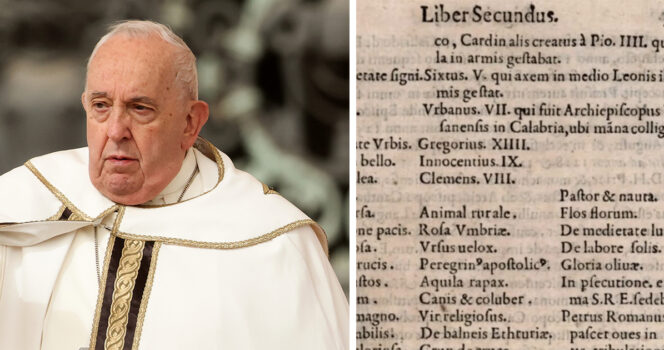The passing of Pope Francis on April 21, 2025, has marked a significant moment in the history of the Catholic Church, prompting widespread attention not only to the future of the papacy but also to an ancient prophecy that some believe may hold critical significance for the future of the Church. As the world mourns the loss of the 88-year-old Pope, who died of a cerebral stroke leading to a coma and heart failure, the question of who will succeed him remains at the forefront of global discussions.
The Prophecy of the Popes
One of the most enduring predictions regarding the papacy is the Prophecy of the Popes, which some believe was written in the 12th century by Saint Malachy, an Archbishop from Ireland. According to legend, Malachy’s prophecy listed the names or descriptions of 112 popes, and it is said to predict that the papacy will culminate with the final pope—referred to as “Peter the Roman”—who will usher in a time of great tribulations, followed by the destruction of the city of Rome and the final judgment.
The Prophecy of the Popes has long been a subject of fascination, particularly in times of significant transitions within the papacy. The prophecy is said to predict that Pope Francis could be the last pope, followed by the final papal figure, whose reign would coincide with apocalyptic events. However, it is important to note that the origins and authenticity of the prophecy have been widely debated, with many critics questioning its accuracy and relevance.

The Link Between Pope Francis and the Prophecy
Saint Malachy’s prophecy describes the final pope as “Peter the Roman,” and some have drawn connections between this description and Pope Francis. Notably, Pope Francis chose his papal name in honor of St. Francis of Assisi, whose father’s name was Pietro, or Peter in English. While this connection may seem tenuous to some, others have speculated that this is a sign that Pope Francis could be the “Peter the Roman” predicted in the prophecy.
While Pope Francis himself has not commented on the prophecy, his choice of the name “Francis” is often cited by those who seek to draw parallels between the prophecy and his papacy. Some believers in the prophecy see this as a confirmation that Pope Francis’ reign will be the final one, especially given the dramatic and turbulent times in which we live.

The End of the World? A Closer Look at the Prophecy
Some interpretations of the Prophecy of the Popes have suggested that the reign of the final pope, including Pope Francis, will coincide with apocalyptic events. According to these interpretations, the prophecy predicts the end of the world in 2027, which adds an urgency to discussions about the future of the papacy and its role in the broader context of world events.
It’s important to clarify that these predictions are not universally accepted within the Catholic Church or among scholars. Many critics have dismissed the Prophecy of the Popes as nothing more than folklore or a misinterpretation of historical events. Josh Canning, director of the Chaplaincy at the Newman Centre in Toronto, stated in 2013 that it is difficult to link the prophecy’s description of “Peter the Roman” to Pope Francis, highlighting the tenuous nature of the connection.
The Catholic Church, while acknowledging its long history of prophecy and scripture, does not officially recognize the Prophecy of the Popes as a legitimate or doctrinal part of Catholic teaching. The Church has not provided any formal endorsement of the prophecy’s predictions, nor has it suggested that it should be viewed as a guide for understanding future papacies.
The Future of the Papacy
While the Prophecy of the Popes remains a topic of speculation and debate, the reality is that the Catholic Church must now focus on the process of selecting Pope Francis’ successor. The transition of papacy is an important and highly symbolic moment for Catholics around the world, and the election of a new pope will be guided by the College of Cardinals.
The process of electing a new pope typically takes place during a papal conclave, where cardinals gather to choose the next leader of the Church. This process can take days or even weeks, as cardinals from around the world deliberate on the best candidate to lead the Church in a time of significant change. The next pope will be chosen based on a range of factors, including spiritual leadership, administrative experience, and the ability to address the Church’s contemporary challenges.
Conclusion: A Time for Reflection
The death of Pope Francis has prompted reflection on the future of the papacy and its place in the broader context of world events. While the Prophecy of the Popes may continue to capture the imaginations of some, the reality is that the future of the Catholic Church is shaped by the decisions made by the College of Cardinals and the guidance of the Holy Spirit.
As the Catholic community mourns the loss of Pope Francis and prepares for the election of his successor, it is essential to remember that the papacy, like all institutions, evolves over time. While prophecies and predictions may offer intriguing insights, it is the faith, leadership, and commitment of the Church’s leaders that will ultimately shape its future.
Sources:
- Vatican News – https://www.vaticannews.va
- BBC News – https://www.bbc.com
- The Royal Family Official Website – https://www.royal.uk


